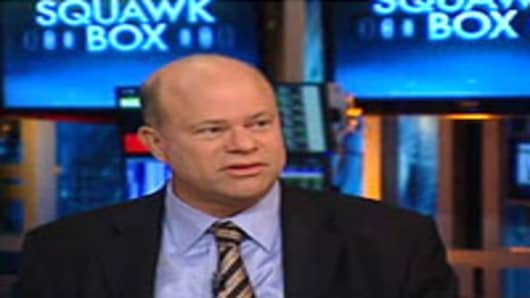The David Tepper Rally has not yet turned into Tepper Rout in the markets—the major indexes are holding just about where they went immediately following Tepper’s remarks on Squawk Box—but his “win-win” analysis is taking a drubbing from respected financial commentators.
Most of the criticism takes aim at Tepper’s belief that Fed policy aimed at reviving the economy will boost the values of financial assets. In Tepper’s brief, stocks will do well if the economy recovers on its own or they will do well if the economy falters and the Fed intervenes.
No doubt he’s encouraged in his view by the fact that he made a king's ransom—no, make that an emperor’s ransom—on betting the government’s intervention on behalf of banks would boost the value of their stocks and bonds. Hey, it worked last time: let’s double down on government aid.
Yesterday we brought you David Rosenberg’s critique, which can be summed up as “the first round of quantative easing didn’t work, so why would anyone think the next round would work?”
Let’s begin today’s round of Tepper bashing with Michael Shedlock, who points out that there is something seriously wrong with the theory behind quantitative easing. Japan is the test case for qualitative easing, having begun QE on March 19, 2001. It took two years to produce a market rally, which then ended in a tear-jerking crash.
Somehow the official lesson from Japan’s experience is the opposite of what you’d expect.
"The Japanese experience suggests that when inflation and short–term interest rates approach zero, central banks should act aggressively, giving greater than normal weight to downside risks. Moreover, they should commit to an inflation target and clearly explain their actions in terms of that target,” the Cleveland Fed wrote in a study.
There’s more than a bit of madness at work here—doing the same thing over and over again and expecting different results.
Mish then digs directly into Tepper’s thesis that further Fed easing will boost the values of financial assets:
Tepper seems to have more confidence in Bernanke than Bernanke has in Bernanke. Even Bernanke seems to understand we are in uncharted territory with uncharted risks.
One such risk is that confidence could severely erode in financial assets (such as equities) denominated in dollars and unsupported by Fed buying. That risk is both significant and heavily skewed to the downside. After all, equities are subject to earnings shock and PE compression, as noted earlier.
Also note that the lift in equities in 2009 was directly related to the lift in corporate bonds. Arguably, Bernanke's one success was unlocking the corporate bond market. Companies priced for bankruptcy on expectation they would not be able to roll over their debt got a new lease on life.
Now junk bonds are back at par. So where to from here? At best, QE2 can maintain that liquidity. At worst, confidence collapses in spite of, or perhaps because of QE2.
Conversely, commodities, especially gold, may be beneficiaries of a loss of confidence in equities, junk bonds, or the dollar. Thus, from a risk/reward perspective, stocks are quite far down on the list of places to be, hoping for QE2.
A month ago everyone was focused on a "Hindenburg Omen". Now everyone is focused on a "sure thing" by the Fed. That is how quickly sentiment can change, and sentiment can just as easily turn again.
Caution, not "sure things" seems like a better bet to me.
Over at Minyaville, Todd Harrison also bashes“win-win”:
When David Tepper and his animal spirits stirred on Friday, the tape took notice. Tepper and his Appaloosa Management Hedge Fund earned quite a reputation the last few years, including a $7-billion earn-out in 2009. The New York Times reported that Mr. Tepper, with his $4 billion personal cut, was single-handedly the top earner in all of Wall Street last year.
While the Street bought stocks on the news — presumably under the impression they could ask questions later — I dialed back to the Spring of 2000. When the tech bubble unwound with furious vengeance and the Fed cut rates in an effort to stem the crimson tide, all you heard, around the Street and throughout the media, was "don't fight the Fed." I didn't subscribe to that notion — and wrote such at the time— but it was a painful lesson for many on Main Street to absorb.
Fast-forward to present day; "Don't fight the Fed" has been taken to an entirely new level. It's no longer about rate cuts — that bullet blasted long ago — it's about massive "intervention,” intricate acronyms, and the full faith and credibility of our government. For those who point to the past — The Depression, the 70s, Y2K — I would offer that this time is indeed different. Never before has the world been so interconnected and leveraged. FDR didn’t know what a derivative was.
I've said it before and I'll say it again, I want to see an economic recovery as I stand to benefit as much as the next guy. Despite what we hear — the recession is over, the upside is easy —let me tell you something you already know: it's not easy and it ain't over. I consider myself an optimistic realist, meaning I hope for the best but will call it like I see it. Before we put the final toe tag on the legacy of this Great Recession, I foresee more pain, perhaps a lot of it.
Is there anybody out there defending poor Mr. Tepper?



